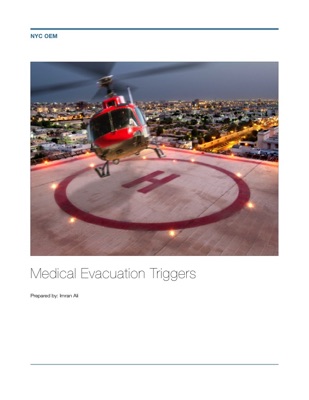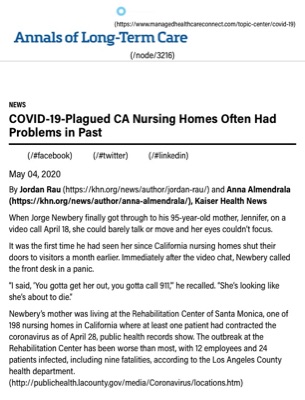Emergency Preparedness
Long Term Care Facilities Not Prepared for Pandemics
Health Policy and Managment with Focus on Emergency Preparedness
I had worked with the NYC Office of Emergemcy Management as part of my practicum for my MPH degree. I had help the team develop the AWS (Alert Warning System) for special needs populations. In addition I had been working on projects to improve hospital evacuation strategies in case of public health emergencies. The mission of the Health and Medical Unit is to support the resiliency of New York City’s medical infrastructure through emergency event planning, information sharing and partnership building. OEM works closely with NYC Department of Health and FDNY- EMS, in addition to several other City and State agencies, and local non-profit organizations. During emergencies, these partners support the City’s response activities in the Emergency Operations Center.
Health care organizations have often compartmentalized administrative functions. Hospitals at where I worked at though however are seemingly increasing the integration of emergency planning within their staff. In other words, there isn’t a separated office of emergency management with its own dedicated staff. For example at Mount Sinai. Dr. Chasen has been involved in emergency operations and on his team are more than just mere administrators. His team includes several members of the medical staff, including security and lab personnel as well.
In this day in age, having an emergency planner is essential. However this planner and his/her team should be multi disciplinary. Physicians and nurses have to play a more active role in emergency preparedness and need to better understand incident command as well as Basic Disaster Life Support. Personally I have taken so much from this course and hope to as a new physician try to encourage the creation of emergency preparedness manager and perhaps team. I say this not only from my readings this past semester but also from studying various case examples of other hospitals and their response to events. It made all the difference when there was a specific and experienced emergency manager in place. Also at Mount Sinai I experienced first hand through a recent exercise the importance of an integrated emergency response team. The scenario included a gunman entering Mount Sinai’s BSL-3 high security laboratory. The exercise required the expertise of physicians, administrators, security personnel and microbiologists. With the possible spread of agent to patient care areas, an evacuation of some areas or shelter in place order had to be instituted. This required massive coordination and certainly would have gone much worse if it were not lead by an experienced emergency planner. Centralizing leadership with someone who is familiar with several agencies’ mode of operation can be crucial during a crisis.
Everybody should be “knowledgable” on disaster preparedness because after all it is a team effort where everyone from charge nurses to janitors are going to help. In case of the exercise at Mount Sinai janitors were deputized to assist in monitoring evacuation points. However having a dedicated planner who could design exercises and continuously improve is important. In a health care facility, the planner cold be a physician, nurse or public health official, but should be well versed in emergency preparedness. Granted, it may not be necessary for the emergency planner be limited to that role and able to also continue in regular clinical or administrative duties. Have a dedicated emergency planner would also make it easy for an incident commander to be selected once a response has become activated.
It could be argued that after the disastrous miscommunication at Memorial Hospital during Hurricane Katrina that HHS or FEMA require a well trained emergency planner. This can make all the difference when an event occurs ensuring that there is hospital point person and/or team that will know exactly what steps to take to interact with state and federal emergency agencies.
I am not certain why economics or politics should interfere with a hospital’s ability to have a emergency preparedness department with a planner. There may be an issue of cost, but but far having a smooth coordinated response to a disaster by far justifies any cost in the long run. An emergency planner would be an investment that would benefit the health care facility.
I know that many area nursing homes and other special needs facilities have a dedicated emergency planner that joins us on conference calls at the NYC OEM during an activation. This was evident with the recent Bronx building collapse. Having a point person who understand how to navigate the system can make a difference.
Simply have someone “knowledgable” will not enough as a point person needs to have developed a working relationship with agencies that might get involved during an activation. I know this from my experience at NYC OEM as I see how these emergency planners know what exactly to do and who to contact, in fact some of them know OEM staff on a first name basis. It may be an ideal situation, but nonetheless something that health care organizations should strive for.
Overall, I believe that having an official office or role for emergency preparedness will ensure that disaster planning, training and improvement are taken seriously and that during an activation a response will be more coordinated. Being “knowledgeable” is just a start but there is much more to it.

NYC AWS
System
Hospital Evacuation

Nursing Homes and Emergency Preparedness
The lessons of Hurricanes Katrina, Sandy and now COVID-19 cannot be neglected any longer. The toll that COVID-19 has taken on America's nursing homes is staggering resulting in 40% of nations' total deaths as of this writing. While taking care of these patients, I had the opportunity to not only deal with the individual nursing home residents and their families but I also got a front row seat to the administrative aspect of managing Long Term Care. I am now working on my DrPH to understand this issue. Overall issues include having ready reserve force due to stafing shortages. The National Guard has been helpful but it may require perhaps members of the USPHS Ready Reserve which has recently been reinstated
Long Term Care Needs A Real Overhaul

